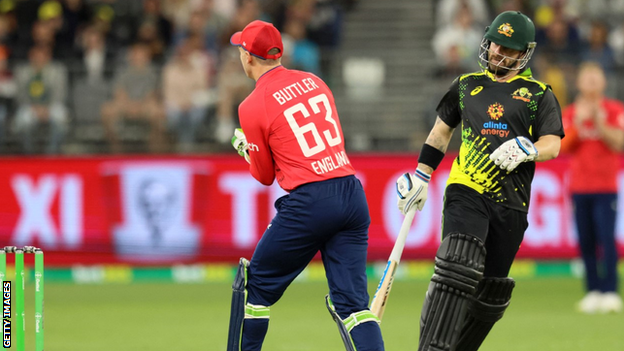Jos Buttler on deciding against 'risky' appeal for obstruction against Matthew Wade
- Published

Matthew Wade was one of Australia's last hopes of victory when the incident happened
England captain Jos Buttler was diplomatic when asked why he did not appeal for obstructing the field against Australia's Matthew Wade in his side's narrow eight-run victory in the first T20 international on Sunday.
With the match in the balance, Wade stuck his arm out and blocked Mark Wood as the England bowler tried to take a return catch after the Aussie batter top-edged the ball into his helmet.
Replays appeared to show an infringement from the Australian and he likely would have been dismissed had England appealed, but Buttler declined the opportunity because he was not entirely sure what had occurred.
Additionally, with a further two T20s in the series and the T20 World Cup to follow, plus a three-match one-day series after the World Cup, the 32-year-old was keen not to incur the wrath of the Australian public so early in the tour.
"I was looking at the ball the whole time so I wasn't sure what happened," said Buttler, who was trying to run around in front of the stumps to take the catch.
"They [the umpires] asked if I wanted to appeal, but I thought we are here for a long time in Australia so it would be a risky one to go for so early in the trip."
Buttler conceded he may have taken a different stance if it had been a World Cup match but, ultimately, the decision did not cost England who defended 208 to win by eight runs.
The match was Buttler's first since recovering from a calf injury and he scored 68 from 32 balls in an opening stand of 132 with Alex Hales.
Hales was preferred to Phil Salt at the top of the order and more than justified his selection by top-scoring for England with 84 from 51 balls.
"Alex has a fantastic record in Australia," Buttler added.
"It was a really difficult decision as Alex and Phil Salt have been batting really well but we just felt Alex's record in Australia puts him ahead.
"He's very destructive, we managed to get off to a great start and I really enjoyed that partnership."